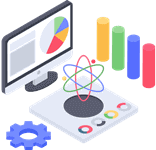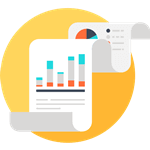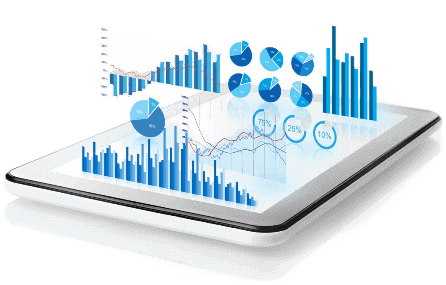 Geospatial information and technology have become indispensable tools for a multitude of applications, from urban planning and environmental management to disaster response and precision agriculture. Geomatics, the science of acquiring, processing, analyzing, and managing geographic data, plays a pivotal role in harnessing the power of spatial information. However, the effective utilization of geospatial data requires not only advanced technology but also expertise in data analysis. That's where we step in, to provide you with data analysis guidance for projects on geomatics and make a significant difference in the success of your academics. Geospatial data encompasses a diverse range of sources, including satellite imagery, aerial photographs, LiDAR scans, GPS measurements, and various geodatabases. Extracting meaningful insights from this wealth of information is a challenging endeavor that demands a keen understanding of geospatial concepts, cutting-edge software tools, and an analytical mindset. This is precisely where our team of experts excels. We can offer quality assistance that is tailored to your specific needs. Whether you are conducting a land-use study, monitoring natural resources, or mapping urban growth patterns, we possess the knowledge and experience to transform raw geospatial data into actionable insights. Our services encompass a wide spectrum of geomatics tasks, from data preprocessing and feature extraction to spatial modeling and visualization. What sets us apart is our unwavering commitment to quality and precision. We understand that the outcomes of geomatics projects carry significant implications for decision-makers in various domains. Therefore, we ensure that every data point is meticulously processed, analyzed, and validated to meet the highest standards of accuracy. Our team comprises seasoned professionals who are well-versed in industry-leading software packages, such as ArcGIS, QGIS, and remote sensing applications, enabling us to tackle projects of varying complexity. In an era where data-driven decision-making is paramount, our assistance can be your strategic advantage. Whether you are a government agency, research institution, or private enterprise, our services can help you unlock the true potential of geospatial data, enabling you to make informed choices, optimize resource allocation, and drive positive outcomes for your projects. In a nutshell, we provide the best data analyzing solutions for geomatics papers.
Geospatial information and technology have become indispensable tools for a multitude of applications, from urban planning and environmental management to disaster response and precision agriculture. Geomatics, the science of acquiring, processing, analyzing, and managing geographic data, plays a pivotal role in harnessing the power of spatial information. However, the effective utilization of geospatial data requires not only advanced technology but also expertise in data analysis. That's where we step in, to provide you with data analysis guidance for projects on geomatics and make a significant difference in the success of your academics. Geospatial data encompasses a diverse range of sources, including satellite imagery, aerial photographs, LiDAR scans, GPS measurements, and various geodatabases. Extracting meaningful insights from this wealth of information is a challenging endeavor that demands a keen understanding of geospatial concepts, cutting-edge software tools, and an analytical mindset. This is precisely where our team of experts excels. We can offer quality assistance that is tailored to your specific needs. Whether you are conducting a land-use study, monitoring natural resources, or mapping urban growth patterns, we possess the knowledge and experience to transform raw geospatial data into actionable insights. Our services encompass a wide spectrum of geomatics tasks, from data preprocessing and feature extraction to spatial modeling and visualization. What sets us apart is our unwavering commitment to quality and precision. We understand that the outcomes of geomatics projects carry significant implications for decision-makers in various domains. Therefore, we ensure that every data point is meticulously processed, analyzed, and validated to meet the highest standards of accuracy. Our team comprises seasoned professionals who are well-versed in industry-leading software packages, such as ArcGIS, QGIS, and remote sensing applications, enabling us to tackle projects of varying complexity. In an era where data-driven decision-making is paramount, our assistance can be your strategic advantage. Whether you are a government agency, research institution, or private enterprise, our services can help you unlock the true potential of geospatial data, enabling you to make informed choices, optimize resource allocation, and drive positive outcomes for your projects. In a nutshell, we provide the best data analyzing solutions for geomatics papers.
What are the major tools used to gather geographic data?
The gathering of geographic data relies on a diverse array of tools and technologies to capture, analyze, and manage spatial information. Geographic Information Systems (GIS) play a pivotal role, enabling professionals to collect and manipulate data from various sources, including Global Positioning Systems (GPS) receivers that provide precise location coordinates. Remote sensing platforms, such as satellites and drones equipped with sensors, capture imagery and spectral data, while LiDAR (Light Detection and Ranging) technology uses lasers to measure distances and create high-resolution elevation models. Cartographic tools, like geographic maps and charts, help visualize and communicate spatial data effectively. Geographic data can also be collected through traditional surveys, including field surveys conducted by geographers and researchers. Furthermore, web-based mapping applications, like Google Maps and OpenStreetMap, enable crowdsourced data collection from users worldwide. These tools collectively empower decision-makers in fields ranging from urban planning and environmental management to disaster response and epidemiology by providing crucial insights into the Earth's physical and social landscapes.
How to effectively assess geospatial data quality for a project?
Assessing geospatial data quality is crucial for any project relying on location-based information. With the best geomatics project data analysis help, it will be easy to follow these easy steps to ensure data quality:
- Do a Data Source Evaluation: Begin by understanding the source of your geospatial data. Assess the credibility, reputation, and data collection methods of the provider or organization.
- Be Accurate: Evaluate the positional accuracy of the data by comparing it to ground truth or high-quality reference data. Consider factors like GPS error, map scale, and coordinate systems.
- Ensure Completeness: Ensure that the dataset contains all necessary information for your project. Check for missing data, gaps, or incomplete attributes.
- Maintain Consistency: Verify that data elements are internally consistent. For instance, check if different layers (e.g., roads, boundaries, land use) align correctly and have consistent attribute values.
- Ensure Precision: Assess the level of detail or granularity in the data. Is it suitable for your project's requirements? Identify any rounding errors or digitization artifacts.
- Confirm Currency: Determine the data's temporal relevance. Ensure it reflects the current state of the environment or objects being represented.
- Evaluate Metadata: Review metadata, including data creation date, update frequency, and information about data sources and processing steps.
- Validate Testing: Conduct validation tests specific to your project's needs, such as spatial analysis or statistical tests to assess data reliability.
- Clean Data: Address errors and inconsistencies through data cleaning and transformation processes.
- Document: Document your assessment findings, including any issues or limitations, to guide data usage and inform stakeholders.
Importance of accurate data analysis in geomatics assignments
Accurate data analysis is of paramount importance in geomatics assignments for the right reasons:
- Precision and Reliability: Geomatics deals with the collection, storage, processing, and presentation of spatial data. Inaccurate analysis can lead to erroneous results and conclusions, undermining the reliability and credibility of the entire project.
- Decision Making: Geomatics data often supports critical decision-making processes in various fields, such as urban planning, environmental management, and disaster response. Accurate analysis ensures that decisions are based on the most reliable information available.
- Resource Allocation: In many cases, geomatics assignments involve the allocation of resources, whether it's planning infrastructure projects, managing natural resources, or optimizing transportation networks. Accurate analysis helps allocate resources efficiently, reducing waste and costs.
- Risk Assessment: Geomatics data is instrumental in assessing and mitigating risks associated with natural disasters, climate change, and other spatially dependent phenomena. Inaccurate analysis can lead to poor risk assessments, potentially resulting in inadequate preparedness and response strategies.
- Environmental Conservation: Geomatics plays a crucial role in monitoring and conserving the environment. Accuracy helps identify environmental trends, track changes, and develop effective conservation strategies.
- Legal and Regulatory Compliance: Many geomatics projects involve legal and regulatory requirements. Accurate data analysis ensures compliance with laws and regulations, avoiding legal issues and potential penalties.
- Public Safety: Geomatics data supports public safety initiatives, such as emergency response planning and disaster management. Accurate analysis can save lives by providing timely and precise information during crises.
 Geomatics encompasses a wide range of applications, from urban planning and environmental monitoring to disaster management and precision agriculture, and in each of these domains, accurate and efficient data analysis is essential. The role of data processing and analysis in geomatics projects is multifaceted. It involves the collection, storage, manipulation, and interpretation of geospatial data from various sources, such as satellite imagery, GPS measurements, and remote sensing. This data is then transformed into actionable information that can be used to address complex challenges and make informed decisions. Whether it's tracking changes in land use, assessing the health of ecosystems, or optimizing transportation networks, geomatics data analysis is the key to unlocking valuable insights. Moreover, the technological advancements in geomatics, such as Geographic Information Systems (GIS), LiDAR, and machine learning algorithms, have revolutionized the way we analyze and process geospatial data. These tools not only enhance the accuracy of analyses but also enable us to handle large datasets more efficiently. As a result, geomatics professionals and researchers can tackle increasingly complex problems and provide innovative solutions to address today's pressing environmental and societal issues. In seeking geomatics research project data analytics consultation and data processing, individuals and organizations can access a wealth of expertise and resources. Collaborating with experts in the field, utilizing cutting-edge software, and tapping into the vast repositories of geospatial data available can significantly enhance the quality and effectiveness of geomatics projects. Ultimately, the success of geomatics endeavors hinges on the proficiency and precision with which data is analyzed and processed, making it an indispensable component of this dynamic and evolving discipline.
Geomatics encompasses a wide range of applications, from urban planning and environmental monitoring to disaster management and precision agriculture, and in each of these domains, accurate and efficient data analysis is essential. The role of data processing and analysis in geomatics projects is multifaceted. It involves the collection, storage, manipulation, and interpretation of geospatial data from various sources, such as satellite imagery, GPS measurements, and remote sensing. This data is then transformed into actionable information that can be used to address complex challenges and make informed decisions. Whether it's tracking changes in land use, assessing the health of ecosystems, or optimizing transportation networks, geomatics data analysis is the key to unlocking valuable insights. Moreover, the technological advancements in geomatics, such as Geographic Information Systems (GIS), LiDAR, and machine learning algorithms, have revolutionized the way we analyze and process geospatial data. These tools not only enhance the accuracy of analyses but also enable us to handle large datasets more efficiently. As a result, geomatics professionals and researchers can tackle increasingly complex problems and provide innovative solutions to address today's pressing environmental and societal issues. In seeking geomatics research project data analytics consultation and data processing, individuals and organizations can access a wealth of expertise and resources. Collaborating with experts in the field, utilizing cutting-edge software, and tapping into the vast repositories of geospatial data available can significantly enhance the quality and effectiveness of geomatics projects. Ultimately, the success of geomatics endeavors hinges on the proficiency and precision with which data is analyzed and processed, making it an indispensable component of this dynamic and evolving discipline.
Help with Analyzing Data in a Geomatics Paper | Data Evaluation
 Where the boundaries between technology and geography merge to unravel intricate spatial patterns, data plays a pivotal role. Geomatics, the science of gathering, managing, and analyzing geographic information, has witnessed a significant surge in research and application over the years. Geomatics professionals and researchers delve deep into a vast sea of spatial data to unearth valuable insights, driving innovation in fields like environmental science, urban planning, agriculture, and more. However, amidst this wealth of data, lies a complex challenge, the need to analyze and interpret it effectively. This is where the importance of the best geomatics data interpretation support is evident. We offer a helping hand to those embarking on geomatics research projects. We can assist you in deciphering the intricacies of data analysis, empowering you to extract meaningful information from your geomatics data. The process of analyzing data in a geomatics research project is no simple task. It involves not only the application of statistical techniques but also a profound understanding of geographic principles and spatial relationships. Researchers in this domain often grapple with diverse datasets, ranging from satellite imagery and remote sensing data to GPS coordinates and geographical databases. Each dataset presents its unique challenges, from data cleaning and preprocessing to spatial modeling and visualization. We understand the complexities and nuances of geomatics research. Our team comprises experts who have honed their skills in geospatial analysis, data mining, and geographic information systems (GIS). We recognize that every research project is unique, with its distinct data sources, research questions, and analytical goals. Therefore, we offer tailor-made solutions to help you navigate through the intricate landscape of data analysis in geomatics. Our commitment extends to guiding you through the entire process of data evaluation, right from the initial data collection phase to the final interpretation of results. Whether you are conducting a study on land-use change, assessing environmental impact, or investigating urban sprawl, we have the expertise to assist you in harnessing the full potential of your geomatics data. We can provide expert geomatics data pattern analysis help.
Where the boundaries between technology and geography merge to unravel intricate spatial patterns, data plays a pivotal role. Geomatics, the science of gathering, managing, and analyzing geographic information, has witnessed a significant surge in research and application over the years. Geomatics professionals and researchers delve deep into a vast sea of spatial data to unearth valuable insights, driving innovation in fields like environmental science, urban planning, agriculture, and more. However, amidst this wealth of data, lies a complex challenge, the need to analyze and interpret it effectively. This is where the importance of the best geomatics data interpretation support is evident. We offer a helping hand to those embarking on geomatics research projects. We can assist you in deciphering the intricacies of data analysis, empowering you to extract meaningful information from your geomatics data. The process of analyzing data in a geomatics research project is no simple task. It involves not only the application of statistical techniques but also a profound understanding of geographic principles and spatial relationships. Researchers in this domain often grapple with diverse datasets, ranging from satellite imagery and remote sensing data to GPS coordinates and geographical databases. Each dataset presents its unique challenges, from data cleaning and preprocessing to spatial modeling and visualization. We understand the complexities and nuances of geomatics research. Our team comprises experts who have honed their skills in geospatial analysis, data mining, and geographic information systems (GIS). We recognize that every research project is unique, with its distinct data sources, research questions, and analytical goals. Therefore, we offer tailor-made solutions to help you navigate through the intricate landscape of data analysis in geomatics. Our commitment extends to guiding you through the entire process of data evaluation, right from the initial data collection phase to the final interpretation of results. Whether you are conducting a study on land-use change, assessing environmental impact, or investigating urban sprawl, we have the expertise to assist you in harnessing the full potential of your geomatics data. We can provide expert geomatics data pattern analysis help.
How do you analyze geographic data in a research project?
Analyzing geographic data requires a multidisciplinary approach that combines geographic information systems, statistics, and domain-specific knowledge. It enables researchers to extract valuable insights, make informed decisions, and contribute to a deeper understanding of spatial phenomena. Relevantly, analyzing geographic data in a research project involves a systematic approach to gathering, process, visualizing, and interpreting spatial information. Here are the key steps in this process:
- Begin by collecting relevant geographic data. This can include sources like GPS coordinates, satellite imagery, maps, census data, or remotely sensed data. Ensure the data is accurate, up-to-date, and suited to your research objectives.
- Clean and preprocess the data to eliminate errors and inconsistencies. This may involve data normalization, georeferencing, and handling missing values.
- Utilize Geographic Information Systems (GIS) software such as ArcGIS, QGIS, or open-source alternatives. These tools enable you to manipulate and analyze spatial data effectively.
- Create visual representations of geographic data using maps, charts, and graphs. This aids in conveying patterns and trends. Heatmaps, choropleth maps, and scatter plots are common visualization techniques.
- Apply statistical methods tailored for spatial data. Techniques like spatial autocorrelation, hot spot analysis, and interpolation help identify spatial patterns and relationships.
- Develop models to explain or predict phenomena based on geographic data. For example, you can use regression models to analyze the impact of geographic variables on a specific outcome.
- Perform spatial queries and analysis to answer research questions. This can involve proximity analysis, buffer analysis, or network analysis, depending on your research context.
- Test hypotheses using appropriate statistical tests for spatial data, like Moran's I test for spatial autocorrelation or Geary's C test for spatial clustering.
- Consider the temporal dimension of your data, especially if it changes over time. Analyze trends, seasonality, or long-term changes to gain insights.
- Analyze the results in the context of your research objectives. Explain the significance of the findings and their implications for your research question.
- Communicate your findings effectively through maps, charts, and narratives. This helps in conveying your results to a broader audience.
Positive impacts of our data analysis service on the quality of your paper
Seeking help with analyzing data in a geomatics paper is essential for organizations and individuals aiming to unlock the full potential of their data. Our experts possess the expertise to extract valuable insights, patterns, and trends from complex datasets, enabling data-driven decision-making. We help businesses optimize operations, enhance customer experiences, and identify growth opportunities, ultimately boosting competitiveness. We also aid in risk assessment and mitigation, improving resource allocation and cost management. In research and academia, we empower researchers to validate hypotheses and draw meaningful conclusions. Seeking our help ensures accuracy, scalability, and compliance with data privacy regulations, allowing clients to focus on their core objectives while harnessing the power of data for informed choices and innovation. Our services have had a profoundly positive impact on the quality of our paper. Through rigorous data collection, meticulous analysis, and insightful interpretation, we have been able to uncover meaningful patterns and trends within our dataset, providing a solid empirical foundation for our research. This has not only enhanced the credibility of our findings but has also allowed us to draw more robust and well-supported conclusions. Furthermore, our data analysis services have enabled us to present our results in a clear and visually appealing manner, through the use of charts, graphs, and tables, making the information more accessible and comprehensible to our readers. In essence, we have elevated the overall quality of our paper, ensuring that it is not only informative but also persuasive and impactful.
 Geomatics, as a field, relies heavily on data to generate insights and make informed decisions, whether it's in the context of land surveying, environmental monitoring, urban planning, or countless other applications. Effective data analysis not only enhances the quality and reliability of research but also facilitates informed decision-making, which can have far-reaching impacts on our environment, society, and economy. We have highlighted some key principles and methodologies that are essential for successful data analysis in Geomatics. These include data preprocessing to ensure data quality, the selection of appropriate analytical techniques, and the consideration of spatial and temporal aspects. Furthermore, we emphasized the significance of visualization tools and geographic information systems (GIS) in aiding the interpretation and communication of results. It's important to recognize that data analysis in Geomatics is an ongoing process, as data continually evolves and new methodologies emerge. Researchers and practitioners should stay abreast of developments in their field and be open to incorporating innovative techniques into their analyses. Geomatics is a dynamic field that relies on robust data analysis techniques to derive meaningful insights and inform decision-making. By adhering to best practices in data evaluation and continuously expanding our analytical toolkit, we can ensure that Geomatics research remains at the forefront of addressing complex spatial and environmental challenges in our rapidly changing world. Our experts provide top-notch statistical consulting services for geomatics assignments.
Geomatics, as a field, relies heavily on data to generate insights and make informed decisions, whether it's in the context of land surveying, environmental monitoring, urban planning, or countless other applications. Effective data analysis not only enhances the quality and reliability of research but also facilitates informed decision-making, which can have far-reaching impacts on our environment, society, and economy. We have highlighted some key principles and methodologies that are essential for successful data analysis in Geomatics. These include data preprocessing to ensure data quality, the selection of appropriate analytical techniques, and the consideration of spatial and temporal aspects. Furthermore, we emphasized the significance of visualization tools and geographic information systems (GIS) in aiding the interpretation and communication of results. It's important to recognize that data analysis in Geomatics is an ongoing process, as data continually evolves and new methodologies emerge. Researchers and practitioners should stay abreast of developments in their field and be open to incorporating innovative techniques into their analyses. Geomatics is a dynamic field that relies on robust data analysis techniques to derive meaningful insights and inform decision-making. By adhering to best practices in data evaluation and continuously expanding our analytical toolkit, we can ensure that Geomatics research remains at the forefront of addressing complex spatial and environmental challenges in our rapidly changing world. Our experts provide top-notch statistical consulting services for geomatics assignments.






 NB: Sometimes we need to first assess your work to quote accordingly. Equally we may highlight a service input review on your placed order to confirm if the paid amount is
NB: Sometimes we need to first assess your work to quote accordingly. Equally we may highlight a service input review on your placed order to confirm if the paid amount is
